For most NHL teams, the question of who is the greatest of all time is not one that is easily answered. Are strictly on-ice measures considered? Is it as simple as choosing the player with the most points or games played? What about goalies? And how do coaches and general managers figure into the equation?
Unless your the franchise of Wayne Gretzky or Gordie Howe, these decisions aren’t easy to make. So for the St. Louis Blues, we decided to cut out the middle man and go directly to the people. In a one-week fan poll run by the author’s podcast, we let the fans determine the Blues’ greatest ever personality.
We’ll discuss each region (named after the four most recent monikers of the Blues’ home arena, counterclockwise from top left) in turn. We’ll move through each round, discussing the vote losers in order from top to bottom, round by round, with added detail as we enter each round. Then we’ll go in-depth on the final four, finishing with our champion, the fan-selected greatest of all time.
Kiel Region
First Round
Mike Keenan
Mike Keenan coached the Blues from 1994-1997. He went 75-66-22 in that time, with three playoff appearances. But he’s most known for trading players like Curtis Joseph and Brendan Shanahan, and his acerbic personality is widely credited with chasing Wayne Gretzky out of town after just half a season. He is a titanic character in the history of the game, but not a very popular one in St. Louis.
Scotty Bowman
Speaking of legendary coaches, Scotty Bowman is the all-time NHL coaching wins leader with a remarkable 1,244. 110 of those came in four seasons with the Blues, the first four seasons of his career and the franchise’s existence. He is a towering hockey legend, but modern-day Blues fans may be more familiar with his surname thanks to his son Stan, who helped manage the archrival Chicago Blackhawks to three Stanley Cups.
Darren Pang
Speaking of the Blackhawks, Darren Pang first rose to prominence as one of their goaltenders, though he was far from the greatest. Just ask him, he’ll tell you so himself!
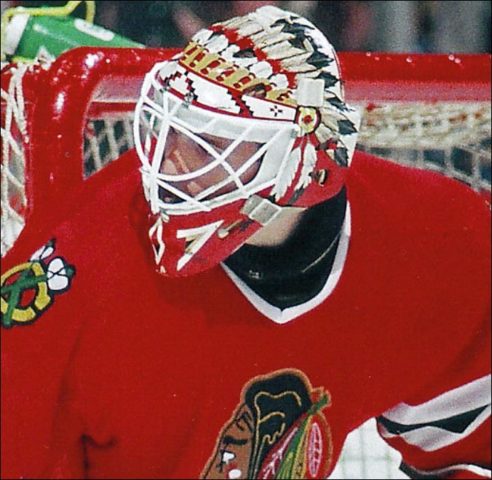
Now, he’s an exciting and iconic hockey color commentator, and he’s served with the Blues’ affiliate Fox Sports Midwest since 2009. He may crack jokes about his diminutive size, but his heart and personality are outsized, and Blues fans adore him.
Emile Francis
Emile Francis — known as “the Cat” due to his wiry frame and quick reflexes during his goaltending days — joined the Blues as their Executive Vice President in 1976. He helped put the team on the map and built them to a then-franchise-record 107 point season in 1980-81. It’s a mark the team has only matched or surpassed thrice since then. The following year, Francis entered the Hockey Hall of Fame as a builder.
Mike Liut
Speaking of great goaltenders, Mike Liut was one of the best of the 80s. He joined the Blues through the draft the same year as Francis, and would go on to play six seasons in St. Louis. During that time, he won 151 games, a mark that still stands as the franchise’s record (though Jake Allen is closing in).
Related: Mike Liut: His Legacy with the NHL’s St. Louis Blues
The Blues traded Liut to the Hartford Whalers, the team Francis moved to as well (sensing a pattern?) Ironically, his story with the Blues would not finish there, as Liut is now an agent who represents Vladimir Tarasenko, among many other players.
Bryce Salvador
Bryce Salvador, perhaps best known for his seven seasons with the New Jersey Devils, where he served as captain near the end of his career, played his first seven seasons in St. Louis. He played 447 games with the Blues, and many fans loved him for his gritty style. He moved to New Jersey in a trade for Cam Janssen, a St. Louis native and another beloved pugilist who we’ll discuss later.
John Kelly
The Blues’ play-by-play announcer on Fox Sports Midwest for many years, John Kelly is the son of legendary hockey broadcaster Dan Kelly, for whom the Blues hung a shamrock in the rafters. Kelly himself is known for his “thank you, thank you, thank you” catchphrase, and he is beloved enough by the St. Louis hockey community that Chris Kerber, the KMOX radio play-by-play voice, surrendered one period of each Stanley Cup game so Kelly could call it.
Cam Janssen
A St. Louis native and legendary local hockey pugilist, many NHL fans will be more familiar with Janssen’s work as a podcast guest on shows like Spittin’ Chiclets. He’s also now started a podcast of his own.
Though Janssen had just six goals and eight assists in a 336 game career, his tenacity and outsized personality made him beloved, especially with his hometown fans. He remains a very popular figure on the St. Louis hockey scene.
Second Round
T.J. Oshie
Current day hockey fans will need no introduction to T.J. Oshie, who remains a fan favorite with the Washington Capitals. Drafted by the Blues, he was beloved as a young superstar for the franchise. His 2014 shootout performance in the Sochi Olympics remains a highlight of his career, and a much-discussed memory in St. Louis.
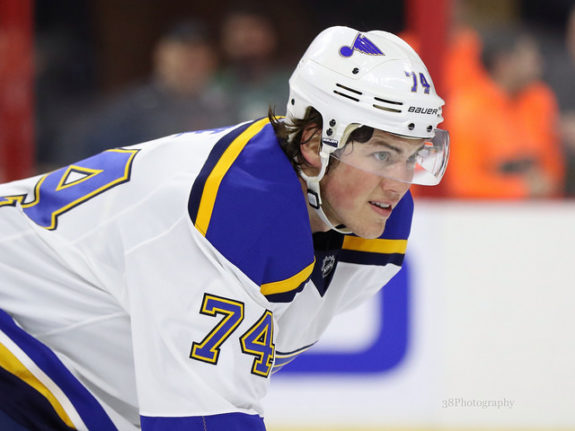
Oshie played in 443 games in his career with the Blues, and he scored 110 goals and 200 assists in that time. Perhaps unfairly, he was scapegoated somewhat by fans and then-head coach Ken Hitchcock, and the Blues traded him to the Capitals in 2015. He quickly established himself as part of Washington’s core and helped them win a Cup in 2018, but the Blues won the Cup the following season, so there are no hard feelings on either side.
Barrett Jackman
Barret Jackman was the perfect embodiment of a St. Louis player, in many ways. The 2003 Calder Trophy winner played 803 games with the Blues, the second-most in franchise history. And while he was the prototype of a stay-at-home defenseman, he found ways to score in the clutch, most famously with his 2014 playoff overtime winner against the Blackhawks. Jackman played one season with the Nashville Predators at the end of his career but remains a Blues fan-favorite and a presence in the community.
Chris Kerber
Already mentioned for giving his microphone to John Kelly during the Stanley Cup Final, Kerber has been the radio voice of the Blues for many years. He is a popular figure, and his call of the final moments of Game 7, when the Blues won their first Stanley Cup, is something almost any fan can quote from memory.
Craig Berube
Craig Berube had coached the Blues for just over one full season at the time of this writing. The fact that he made the second round and actually competed with Mr. Blue Bobby Plager tells readers everything they need to know about Berube’s impact during that time.
Taking over for Mike Yeo in November 2018, he turned the Blues around over time and coached them to their very first Stanley Cup. It doesn’t hurt his popularity that during his playing career, he was exactly the kind of blue-collar tough guy St. Louis fans warmly embrace. Berube retired with over 1,000 games played and sits seventh all-time with 3,149 penalty minutes.
Sweet Sixteen
Keith Tkachuk
These days, the surname Tkachuk is more famously associated with the second generation of this family’s dynasty: Brady with the Ottawa Senators and Matthew with the Calgary Flames. But the two sons, both St. Louis natives, have a long way to go before they’ve caught the legacy of their father, the man affectionately known as “Big Walt.”
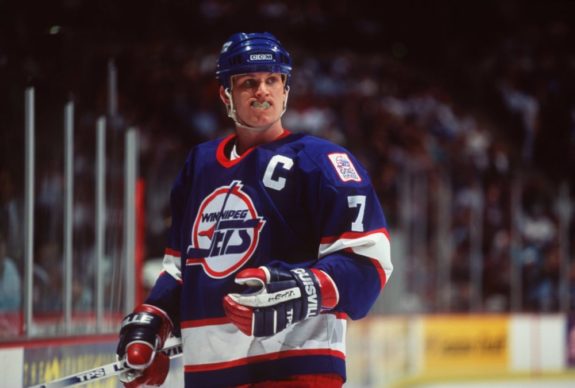
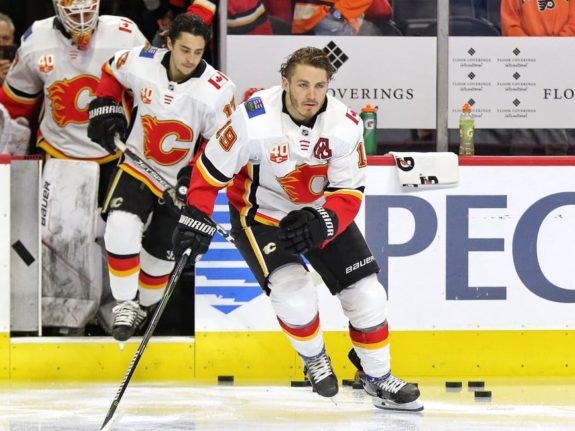
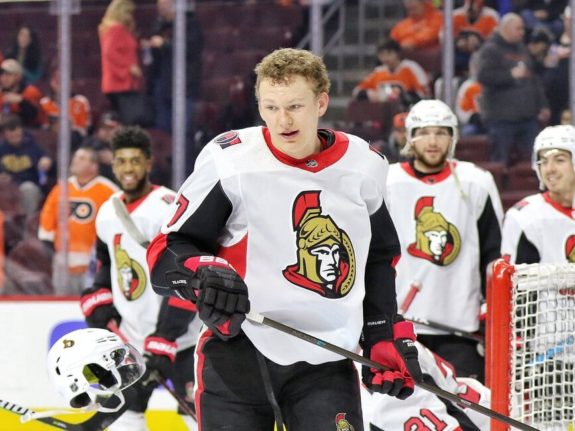
The elder Tkachuk played 1,201 games in his career, amassing 1,065 games played in that time. He is among the greatest American players of all time. 543 of those games came in St. Louis during three different stints, where he retired after the 2009-10 season. He still resides in St. Louis, and his home is not only the offseason residence of Brady and Matthew, but it has served as Robert Thomas’ pad during the regular season in his first two seasons with the Blues.
Alex Steen
Alex Steen has been a massive win for the Blues since the day he arrived in St. Louis, traded by the Toronto Maple Leafs along with Carlo Colaiacovo in exchange for Lee Stempniak. The trade remains one of the best in Blues history and one of the worst in Toronto’s history.
Steen played his 1,000th career game in the 2019-20 season, and it’s hard to believe that even 253 of those came with the Maple Leafs. He is viewed as a career Blue, and should easily reach the 500 point mark if he is allowed to return to action in St. Louis. When the Blues won the Stanley Cup, the veteran Steen was the third player to hoist it, a mark of his respect and seniority in the locker room.
Elite Eight: Bobby Plager
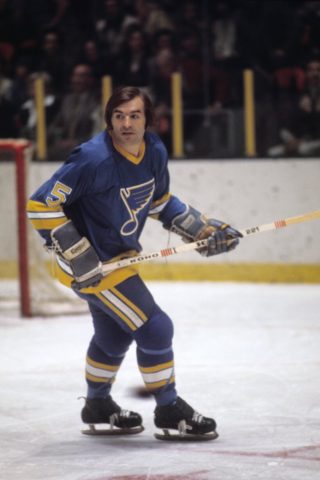
Already mentioned as “Mr. Blue,” the middle of the three Plager brothers, all of whom played at some point for the Blues, Bobby is the one that remains with the franchise to this day. Both Bob and Barclay, the latter of whom passed away in 1988, have their numbers retired in the rafters with the Blues.
Plager played 645 career NHL games, all but 29 of those in St. Louis. He and Barclay joined the Blues for the franchise’s inaugural season in 1967-68 — Bill would come along the following season. Bobby played the most games of all three, edging out Barclay by just two contests.
But Bobby’s legacy with the Blues comes as much off the ice as on. After he retired, he joined the team’s front office and is considered a pioneer of advanced scouting, incorporating statistics into the analytical process. From there he coached the AHL franchise and briefly the NHL Blues before returning to the front office. The Blues have barely known a day without Bobby Plager in some role with the organization, and the community was thrilled to see him finally get his Stanley Cup parade.
Scottrade Region
First Round
Jaroslav Halak
The first major acquisition of general manager Doug Armstrong’s career with the Blues, Jaroslav Halak never quite became the longterm goaltending solution many hoped. But he still started 156 games, and his 20 shutouts in that time remain third in franchise history. He’s continued to build a strong career after Armstrong dealt him and others for Ryan Miller.
Brian Elliott
Brian Elliott had an even bigger impact on the Blues in five seasons than Halak did. Signed as a preseason tryout to compete with Ben Bishop, he became a spotless platoon goalie with both Halak and Jake Allen.
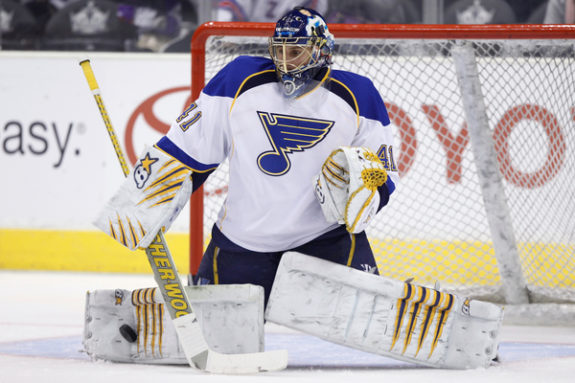
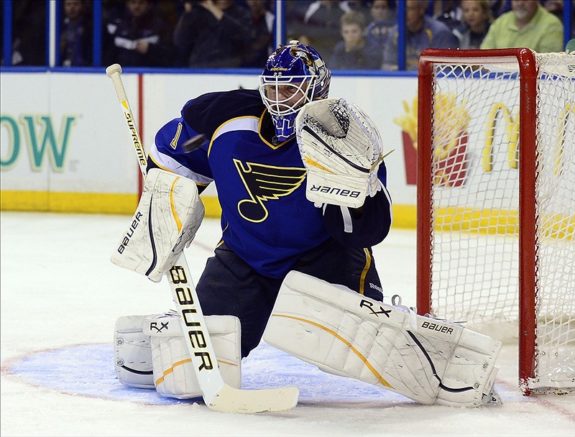
Before he was traded to the Calgary Flames, a trade that brought back the pick that brought in top prospect Jordan Kyrou, he recorded 25 shutouts, which still stands as the franchise record.
Joe Mullen
Hockey Hall of Fame inductee Joe Mullen played the first 301 games of his career with the Blues. During that time, he scored 335 points. Unfortunately, it wasn’t until after Mullen was regrettably traded to the Flames in 1986 that he began winning Stanley Cups, which he did three times in his career.
Kevin Shattenkirk
Armstrong acquired Shattenkirk when he traded former first overall pick Erik Johnson to the Colorado Avalanche. Shattenkirk developed into a fan favorite defenseman and power play weapon. In 425 games, he collected 258 points, before Armstrong dealt him to the Washington Capitals in 2017.
Red Berenson
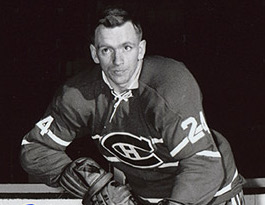
Red Berenson is a hockey legend as much as he is a Blues legend, who fell in the first round only for drawing the unfortunate matchup with a Stanley Cup legend. He played 519 games in St. Louis, scoring 412 points, and he famously scored six goals in a game in Nov. 1968. After retiring, he coached the Blues and won a Jack Adams Award as the NHL’s best head coach. From there, he moved onto his legendary 33-year stint as the head coach of the Michigan Wolverines, which ended in 2017.
Tony Twist
Tony Twist is a beloved grinder who once sued legendary comic book artist Seth McFarlane for naming a character after him — and won $15 million. It was that kind of unrelenting tenacity that made him a fan favorite during his 294 games with the Blues.
David Perron
David Perron is in his third stint with the Blues. In fact, though he’s played for five different teams in the NHL, he has never signed a contract with any team other than St. Louis. And his recent stint, which began when Armstrong signed Perron prior to the 2018-19 Stanley Cup season, has been his most successful to date. Perhaps that’s because of his “bromance” with Ryan O’Reilly.
In Perron’s 550 career games with the Blues, he’s scored 350 points. And he was a major player in the Stanley Cup run, with 16 points in 26 playoff games. Perron wears his heart on his sleeve, and his heart bleeds Blue. He calls St. Louis “home” and his “first love,” and Blues fans are beginning to show him the same appreciation.
Jamal Mayers
Jamal Mayers had a lengthy, 595 game tenure with the Blues after the team drafted him in the 4th round in 1993. He is a likable person and a reliable two-way forward, and he recently wrote Hockey is for Me, a children’s book telling the story of his journey as a black hockey player.
Second Round
Doug Gilmour
Most hockey fans won’t need an introduction to Hockey Hall of Fame inductee Doug Gilmour. But many might not know that it was the Blues who drafted him into the league in the seventh round in 1982. Gilmour played his first five seasons in St. Louis, and scored 354 points in 384 games, still good for 10th in franchise history in points per game.
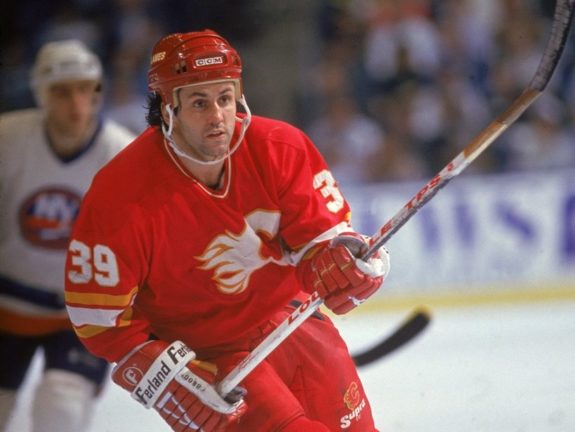
Sure, it stings that a legal predicament forced the Blues to trade him to the Calgary Flames prior to the 1988-89 season, whereupon he immediately helped them capture the Stanley Cup (including scoring the Cup-winning tally). But Blues fans are used to a history of that kind of heartache. He’s still a legend that got his start in St. Louis, and he assembled a great career with the team.
Joel Quenneville
Speaking of legends that got their start in St. Louis, Joel Quenneville, the bench boss affectionately known as “Coach Q,” coached his first eight seasons in St. Louis. In that time, he went 307-191-77-18, laying the foundation for an incredible career. He now sits second all-time in coaching wins, and if he wants to coach a few more seasons, Quenneville stands to coach more games than any other head coach in history.
Pavol Demitra
Pavol Demitra is sixth in Blues history with 493 points, almost exactly one point for each of the 494 games he played for the team. He helped ease the pain of Brett Hull’s departure from the franchise, scoring 89 points the season after he left St. Louis.
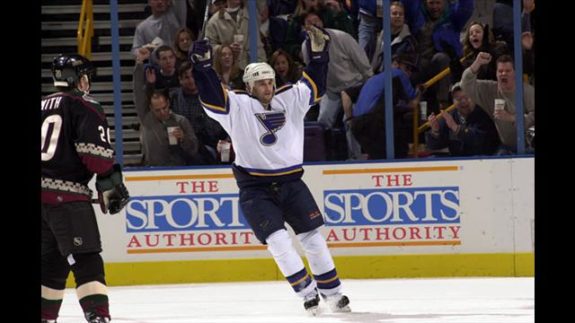
The season after that (1999-2000) he won the Lady Byng Memorial Trophy, showing just how decent a person he was as well. Tragically, he was one of the lost souls on board the 2011 plane crash that claimed the lives of 44 people, including the Lokomotiv Yaroslavl Hockey Club of which Demitra was then a member.
Garry Unger
Probably underappreciated because of the unsung era in Blues history during which he played, Garry Unger is still a franchise legend. He was the team’s best player during the 70s, and he still ranks ninth in games played (662) and fourth in points (575). He joined the Atlanta Flames for the 1979-80 season, ending his decade-long tenure in the Gateway City.
Sweet Sixteen
David Backes
David Backes is a Blues player through and through. The native of Minneapolis, MN went to the Blues in the second round of the 2003 NHL Draft, and he played for the franchise for a full decade from 2006-2016. For the final five of those seasons, he also served as the team’s captain, among the longer tenures in franchise history.
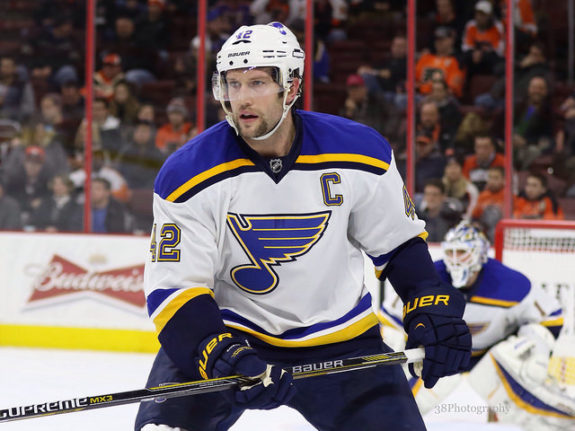
Backes played 727 games for the Blues, the seventh-most in franchise history. He also has the seventh-most goals (206) and the seventh-most points (460). Though he never lifted the Cup in St. Louis and departed on a regrettable five-year contract with the Boston Bruins, Backes is still beloved in the town where he spent most of his hockey career, and many expect him to have a future with the organization after he retires.
Curtis Joseph
Curtis Joseph is an iconic hockey goaltender, one of the true innovators in goalie mask adornment, and a true “one that got away” for the Blues. “Cujo” went undrafted, but he debuted with the Blues during the 1989-90 season. For three consecutive seasons, he posted the most saves in the NHL, and in the middle of those three (1992-93), he collected the highest save percentage as well. It was only poor decision-making by Keenan that led to his departure following the 1994-95 season.
Related: Top 3 All-Time St. Louis Blues Goalies
Joseph played his first 280 games in St. Louis, 10 more than he played in Toronto or anywhere else. He is third in wins for the Blues (137), second in saves (7,940), and first in goals saved above average (GSAA) and goals allowed adjusted, two advanced metrics for goaltenders. Joseph is a borderline Hall of Fame candidate, and certainly, a goaltending legend who got his start in St. Louis.
Elite Eight: Chris Pronger
When you talk about some of the nastiest, grittiest, and — depending on whom you ask — downright dirtiest defensemen in the history of the NHL, Chris Pronger’s name will be at the top of the list. But he will also inevitably be discussed amongst the greatest NHL defensemen of all time. The Blues have needed to retire his number for a long time, and they announced this season that finally, #44 would join the other untouchable numbers in Blues history next season.
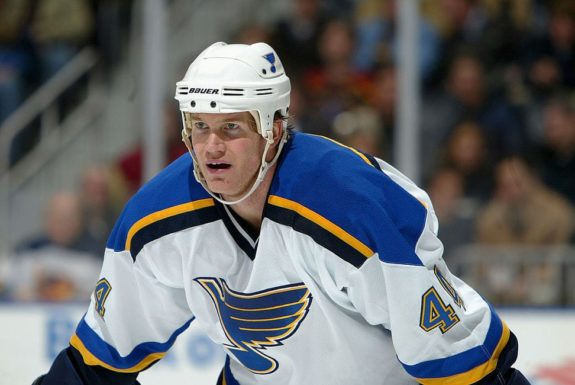
Pronger is one of just two players (along with Hull) to win a Hart Trophy in Blues history, which he did in a phenomenal 1999-00 season. With 14 goals and 48 assists, a league-leading plus-52 rating, and an inconceivable 30:14 average time on ice, Pronger led the Blues to their only Presidents’ Trophy. He also won the Norris Trophy that season.
Pronger captained St. Louis from 1997-98 to 2001-02. He played 598 games with the team in nine seasons from 1995-2004, and during that time he averaged 29:03. Perhaps it’s no surprise that his body didn’t hold up late in his career. Still, after he left the Blues, he did win the Stanley Cup in 2007 with the Anaheim Ducks. It was the crowning achievement of an unquestionable Hall of Fame career, an honor he achieved in 2015.
Savvis Region
First Round
Pat Maroon
Few players in this bracket had a shorter tenure with the Blues than Pat Maroon. But the self-described “hometown hero, baby” made a huge impact in his one season with the team, even scoring the game-winning goal in the Blues’ climactic double-overtime, game 7 second-round series against the Dallas Stars. Few players made as significant a contribution in one season as did Maroon, and he deserves a spot on the bracket.
Dallas Drake
Dallas Drake served two seasons as the Blues’ captain in one of the leanest periods of the franchise’s history, including the season in which they earned the number one overall pick (2005-06) and the season following. All told, Drake played 443 of his 1,009 career games with the Blues and retired one season after leaving town.
Doug Weight
Doug Weight may better known as a player for his time with the Edmonton Oilers, where he played almost 600 games. And he might be more familiar to modern-day fans as the short-term head coach of the New York Islanders, a team for whom he also played. But make no mistake, Weight had some of his best seasons with the Blues.
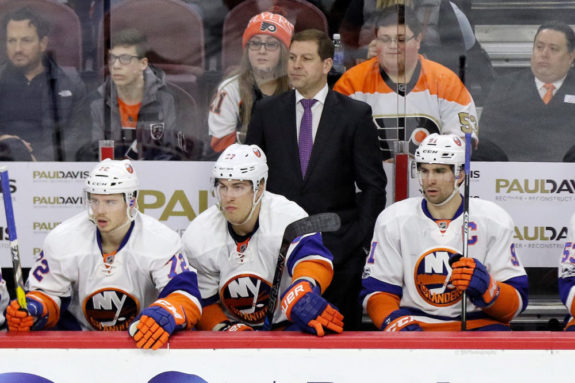
Weight played 364 games in St. Louis, scoring 295 points in that time. He departed twice, including to help the Carolina Hurricanes win the Stanley Cup in 2006, but returned to the Blues two times as well. He would depart for good during the 2007-08 season, bringing back Andy MacDonald in a trade to the Anaheim Ducks. After that, he would finish his career with the Islanders before turning to coaching. In St. Louis, he is remembered as a top player during a lean era for the team.
Larry Patey
Larry Patey is little-remembered today, but he had a solid career in St. Louis. He played 603 games for the Blues, scoring 259 points. He also scored eight shorthanded goals in the 1980-81 season, a franchise record for the trivia buffs out there. Patey still has roots in the St. Louis area, as he remains a real estate agent in the suburb of Chesterfield, the hometown of Clayton Keller of the Arizona Coyotes.
Brendan Shanahan
Shanahan is one of the few players on this list who arguably did more damage to the Blues than for them, but he still played 277 games in St. Louis and is sixth in points per game (306). In a much-maligned deal at the time, the Blues traded Shanahan for Pronger. We already discussed how the latter worked out in St. Louis. Shanahan went on to become one of the team’s primary nemeses in his legendary career with the Detroit Red Wings.
Ron Caron
Known as “the Professor,” Ron Caron is arguably the greatest general manager in franchise history, with the possible exception of Doug Armstrong, whom he met in this bracket. During his tenure (from 1983-1994), he brought in many of the players discussed in this bracket, including Shanahan, Gilmour, Hull, and Adam Oates. “I don’t know if there was a more passionate hockey man in the world,” said Bernie Federko of Caron on his passing in 2012.
Wayne Babych
The older brother of Dave Babych, Wayne Babych had a perfectly respectable NHL career in his day, too, most of it with the Blues. There’s no discounting that righteous 1980s flow, either.
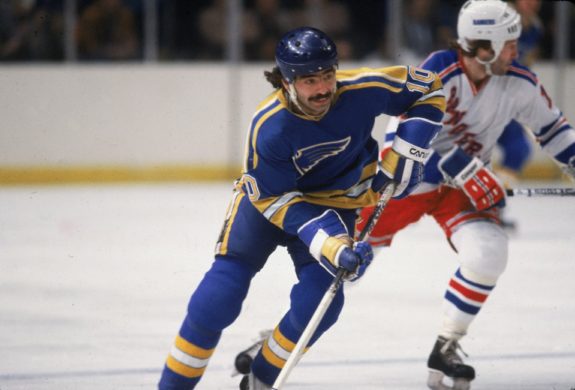
Babych played 396 games wearing the Bluenote, and scored 345 points in that time. He was one of the team’s best players in the early 80s, before moving onto the Pittsburgh Penguins.
Ryan Reaves
Modern-day NHL fans probably need no introduction to Ryan Reaves. The modern-day enforcer played 419 games with the Blues and was absolutely adored during his time. While his departure stung, the overwhelming return, including Oskar Sundqvist and Klim Kostin, is still paying major dividends for St. Louis.
Second Round
Jake Allen
Jake Allen has had his ups and downs in St. Louis. But he’s had a resurgence in the 2019-20 season, following the trend of thriving in tandem or backup roles. When the Coronavirus pandemic put the 2019-20 season on pause, he was just three games short of Liut’s 151 win franchise record.
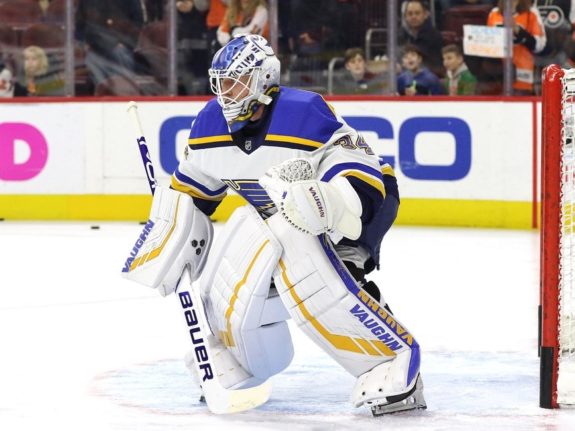
Whether Allen gets to see that to a conclusion remains a mystery as of this writing. The status of the season is still up in the air, and if it is canceled entirely, it’s very likely the Blues will need to move Allen as a salary cap cutting measure. Either way, he’s had a long and successful career with St. Louis, a franchise he’s been in for over a decade, and he deserves recognition and respect.
Al Arbour
Al Arbour is a coaching legend who ranks fifth all-time with 782 victories behind the bench. 42 of those came in St. Louis, as Arbour served two stints with the team, winning 21 games both times. He also played the last four seasons of a very successful playing career with the Blues as well, servings as the inaugural franchise captain for three seasons before becoming a coach halfway through season four. The Hockey Hall of Famer certainly has a significant role in Blues’ history. Fun fact: he was also the last NHL player to wear eyeglasses during a game.
Doug Armstrong
Put simply, Armstrong built the Stanley Cup Blues. Serving as the team’s general manager for a full decade before the ultimate victory, he acquired roughly a dozen of the players, coaches, and personalities on this list, from Halak, his very first deal as general manager, to more recent additions like O’Reilly and Maroon.
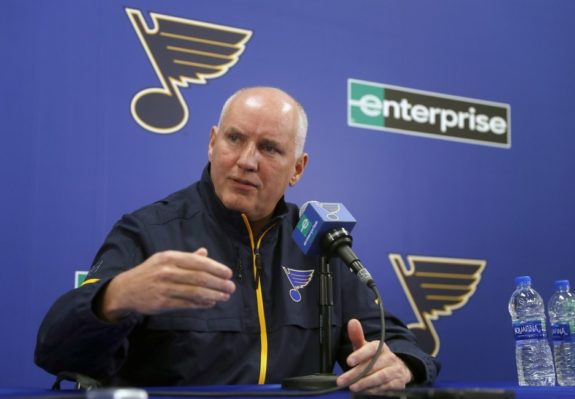
In this writer’s opinion, Armstrong is the best GM in franchise history. And the very fact that he beat out “the Professor” Ron Caron in the first round is evidence of that, although recency bias is also a factor there. Ultimately, though, Armstrong is a victim of his own genius, as he fell in this round to one of his own most popular draft picks.
Jay Bouwmeester
Speaking of Armstrong’s acquisitions, Jay Bouwmeester was one of his biggest trade moves. He has played 1,240 games in his career since going 3rd overall in the 2002 Draft. He arrived in St. Louis as a league-leading Iron Man, and though he’s struggled with injuries somewhat in that time, he’s still played 490 games with the Blues, more than any other team.
Bouwmeester recently suffered a cardiac event during a game against the Anaheim Ducks. While he seems to be recovering well and is in relatively full health, the future of his hockey career is in jeopardy. But, if anything, he’s become even more popular since this episode. That’s an impressive statement, considering he was the veteran player that captain and long term defensive partner Alex Pietrangelo handed the newly-won Stanley Cup to first.
Sweet Sixteen
Dan Kelly
The first iconic voice of the Blues, Dan Kelly is the father of John, and his shamrock is retired in the rafters at Enterprise Center. But Kelly called much more than Blues games. Between 1969 and 1988, he broadcasted 16 Stanley Cups, as well as the 1987 Canada Cup and the 1988 Olympics in Calgary, Alberta. Among his highlights is perhaps the most iconic hockey moment in history, calling Bobby Orr’s flying goal in the 1970 Stanley Cup Final.
Tragically, Kelly passed well before his time, succumbing to lung cancer in 1989 just a year after calling the Olympics. But his memory towers over the game, including in the voice of his two sons who are both broadcasters today. Not only did the Blues raise Kelly’s shamrock, but they also named the Enterprise Center press box in his honor.
Brian Sutter
In falling to Tarasenko, Brian Sutter was certainly a victim of recency bias. The second-oldest brother of a famed hockey dynasty, Sutter is rivaled only by Bobby Plager for his tenure with and importance to the Blues. He is third in franchise history in games played (779) and points (636). For most of his on-ice career, he was the Blues captain, serving for nine seasons from 1979-80 to 1987-88, a far longer tenure than any other captain.
Upon his retirement, his #11 sweater was retired. Immediately thereafter, Sutter moved behind the bench, serving as head coach from 1988-92, winning the Jack Adams Award in 1991. After leaving in 1992, Sutter served as a coach elsewhere, representing a team other than the Blues for the first time in his 16-year Blues career. He has a towering legacy with this franchise but is not as recognizable with the Blues as the man that surpassed him.
Elite Eight: Vladimir Tarasenko
Armstrong drafted Tarasenko with the 16th pick in the 2010 Draft, his first at the helm of the Blues. For much of the decade since then, he’s been the face of the franchise. He spent two more seasons in his native Russia, before debuting in 2012-13 lockout-shortened season with two goals against the Detroit Red Wings. Between 2014 and 2019, he scored 30-plus goals each season, netting 40 for the first (and to date only) time in 2015-16.
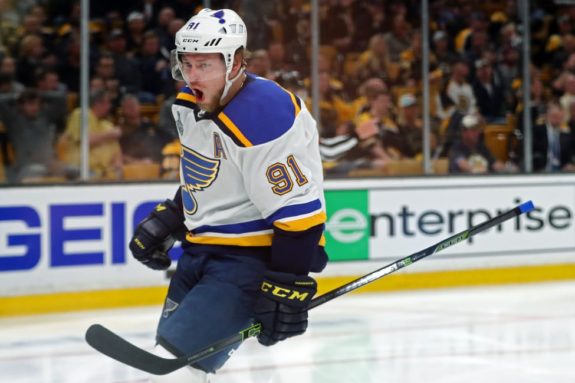
In 2016, a fan vote nominated Tarasenko as the cover athlete for EA’s NHL 17. Even despite suffering a major shoulder injury and missing most of the 2019-20 season, he is already fifth in franchise history in goals (214) and 10th in points (428). His 11 goals were a major factor in winning the Stanley Cup in 2019. As many points as Tarasenko contributes on the ice, he earns many more off the ice for his focus on the fans. He is as popular an athlete as St. Louis has right now.
Enterprise Region
First Round
Jeff Brown
Jeff Brown had an impressive NHL career, scoring 584 points in 747 games as a defenseman. Most of that he did in St. Louis, playing 329 games and scoring 294 points. Brown remained a force in the city after his retirement, coaching a number of local semi-professional and youth teams. The Senators drafted Brown’s son, Logan, 11th overall in 2016, a year in which five St. Louis natives went in the first round.
Wayne Gretzky
Fans need no introduction to Gretzky, who has the shortest St. Louis tenure of any player on this list. Still, when “the Great One” plays for your franchise, he belongs in your tournament. He played 18 regular-season games with the Blues, scoring 21 points. Unfortunately, a sour relationship with Keenan forced Gretzky to leave town and head to the New York Rangers for the final three seasons of his career.
Pierre Turgeon
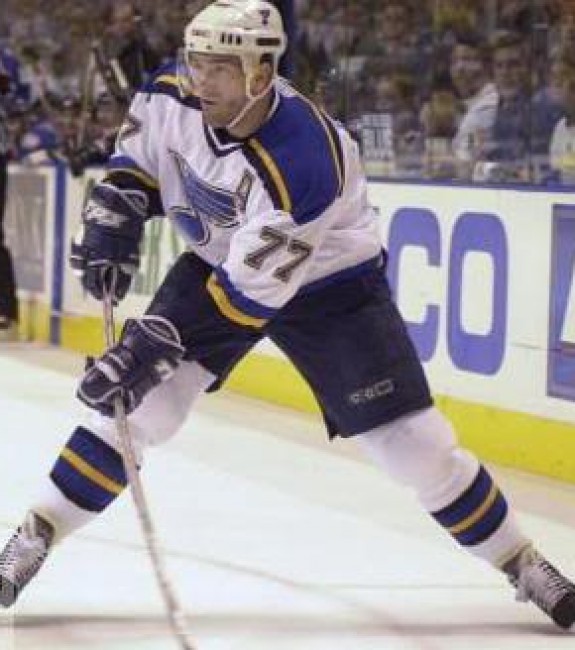
Pierre Turgeon is a strong candidate for the Hockey Hall of Fame and had a phenomenal tenure with the Blues. He played 327 games and registered 355 points, putting him seventh in points per game in the history of the franchise. Turgeon also scored 45 points in 50 postseason games. He departed St. Louis as a free agent and joined the Stars. When he retired, he had 1,327 points in 1,294 games, but he might not have the hardware — winning just one Lady Byng Trophy — to earn Hall of Fame nomination.
Ken Wilson
Ken Wilson spent 20 seasons as a Blues’ broadcaster on various networks. He was well known for his “oh baby” catchphrase. He also called one of the most famous games in franchise history, the Monday Night Miracle, in which the Blues overcame a three-goal deficit with 12 minutes remaining in the third period. After leaving the Blues following the 2003-04 season, Wilson returned to Honolulu, Hawaii, where he began his broadcasting career.
Patrik Berglund
By the time Patrik Berglund was part of Armstrong’s package to acquire O’Reilly, many fans viewed him as an underproducing player on an overpriced contract. But that is a disservice to his legacy in St. Louis, one which sees him eighth in franchise history in games played (694). Before his final contract, “the Big Swede” was a big personality who was much-loved by Blues fans.
Kelly Chase
Kelly Chase may be thought of first and foremost as a bruiser. But he also had a big heart for his community, which is why he won the King Clancy Memorial Trophy for establishing an organized hockey program for those with special needs.
Chase played the lion’s share (345) of his career games in St. Louis, and after his retirement, he served as the Blues’ color commentator on the radio for almost two decades. Even after leaving the team, he played a vocal role in motivating the team and the fans for the Stanley Cup run, as seen in the tweet above.
Larry Pleau
At present, Larry Pleau remains the longest-tenured Blues general manager in history, serving from 1997 until he retired and handed the reins to his mentee, Armstrong, in 2010. In that time, he helped build the only Presidents’ Trophy-winning team in franchise history during the 1999-00 season. But many fans have not forgiven him for his role in dismantling that team in order to facilitate the sale of the franchise that eventually occurred after the 2005-06 season, whether the blame is truly his or not.
Tyson Nash
Likely more famous now for his role as a commentator with the Arizona Coyotes, Nash played 255 games, more than half his career, in St. Louis. He was a beloved pest, averaging 1.8 PIM per game during his entire career. Blues fans loved him, opposing fans hated him, and that was just fine for Nasher.
Second Round
Jaden Schwartz
Drafted two picks before Tarasenko in 2010, Jaden Schwartz has often been described as “the straw that stirs the drink” in St. Louis. While he isn’t the most appreciated player around the league, he is an engine, and when he’s on, the team seems to be on. And when he’s been injured — something he’s struggled to avoid throughout his career — the team looks noticeably off.
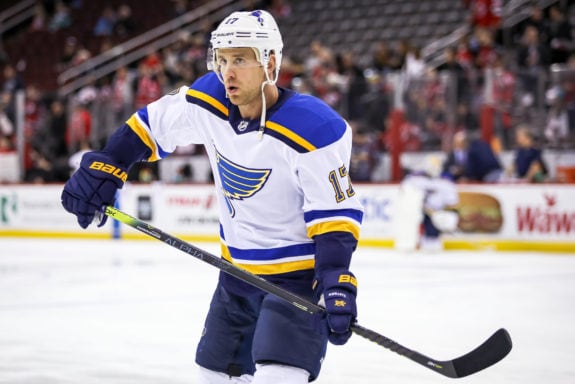
Schwartz has played all 520 games of his career with the Blues, collecting 364 points and going plus-72 in that time. He has a knack for scoring in bunches, as he’s had four career hat tricks in the regular season, and added two en route to the Stanley Cup in 2019. Schwartz plays every game wearing #17 in memory of his sister, Mandi, a great hockey player in her own right. The Blues have established a bone marrow donor registry in her honor, helping the Schwartz’s give back to the community.
Ken Hitchcock
Much like Keenan, Hitchcock is not what anyone would call a “player’s coach.” But Hitchcock had a much more successful tenure with the team. Taking over midseason in the 2011-12 season, he coached the team back to the playoffs and won the Jack Adams Award for his efforts. All told, “Hitch” coached 413 games in his tenure with the Blues, with an impressive .650 winning percentage. He helped the team reach the Conference Final in 2015-16 for the first time since 2000-01, and is second only to Quenneville in wins with 248.
Adam Oates
There is no more iconic duo in Blues’ history than “Hull and Oates,” the unparalleled albeit far too brief partnership between the two dynamic forwards. The Blues traded Federko’s final season for the young, promising center, now considered one of the worst trades in Red Wings history.
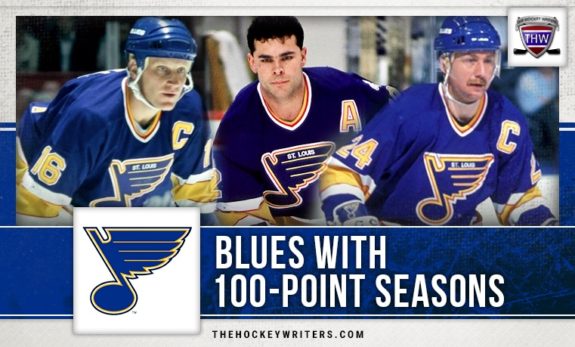
The Hockey Hall of Fame member had 1,420 points (1,079 of them assists) in his 1,337 game career. Sadly, only 195 of those games came in St. Louis, but in that time, he collected 228 assists and 286 points, making him the career leader in both categories per game for the Blues. Hull and Oates were a magical pairing, but contract disputes forced the Blues to trade the latter in 1992, making the music stop well before its time.
Grant Fuhr
Grant Fuhr deserves a spot on this list for his legendary 1995-96 season alone. He showed up to the team out of shape, angering Keenan in the process. But after finding a trainer and getting back in prime form, he played in an NHL-record 79 games. All told, Fuhr started 249 games in his time with the Blues, a real resurgence late in his Hall of Fame career. His 108 wins rank fourth in franchise history.
Sweet Sixteen
Ryan O’Reilly
The fact that O’Reilly advanced to the “sweet sixteen” of this tournament speaks to the magnitude of his contribution to the team. He arrived prior to the 2018-19 season and was by far the team’s best player throughout the campaign. In fact, he was just about the only bright spot before their late-season turnaround. His 77 points led the team.
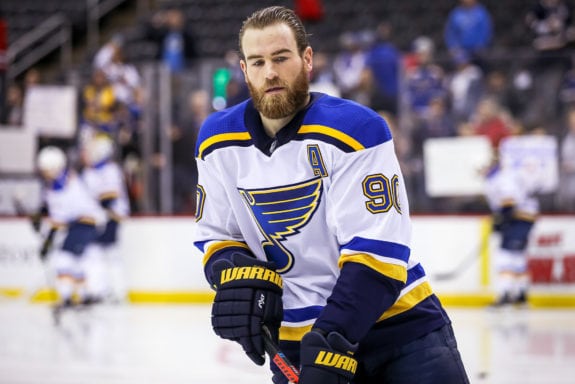
O’Reilly steered the team to the postseason, his first in five seasons. Though he had a slow start, he finished with 23 points in 26 games after a very strong Stanley Cup Final. That would earn him a Conn Smythe Trophy, which, coupled with the Selke Trophy he would win in the offseason, made O’Reilly’s 2018-19 a pretty incredible debut maybe the greatest individual season in Blues history.
Barclay Plager
The Plager name carries a lot of weight in St. Louis, as already discussed with Barclay’s brother Bobby. Though he played a few fewer games, Barclay collected 85 more points in his career than his brother. He became a coach, but his one season with the Blues was one of the worst in franchise history. But he returned to the team as an assistant coach and would serve as such until his unfortunate and untimely passing. Still, his #8 is retired by the team, and his brother Bobby proudly carries his legacy forward.
Elite Eight: Bernie Federko
If this were purely a competition of team accomplishment, Federko might be the runaway favorite. He is, after all, the career leader in games played (927) and points (1,073) for the franchise, and built almost the entirety of his Hockey Hall of Fame career in St. Louis. Federko is also the first player in NHL history to record 50-plus assists in 10 consecutive seasons.
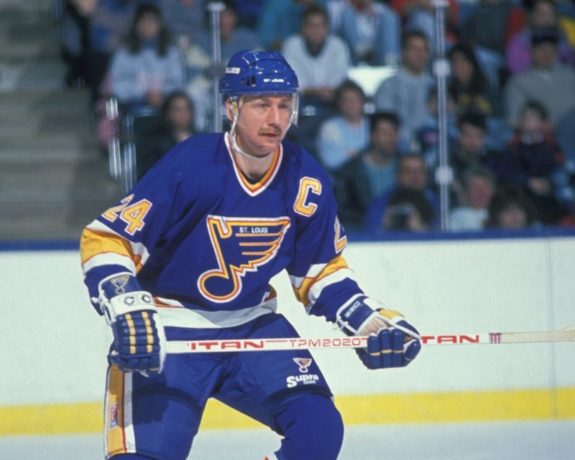
Federko served as the team’s captain for just one season, playing most of his career alongside Sutter. But he was certainly the best player of that era. His penchant for making his teammates look good earned him the nickname “the Magician,” and his head coach Jacques Demers said at the time that
“he’s got to be the most underrated player in this league.”
Constantly overshadowed by his contemporary Gretzky, Federko is arguably one of the most underrated players in league history. He retired after one season with the Red Wings. All told, he scored 1,130 points in exactly 1,000 career games played, making him 18th in points per game in league history. Since retiring, Federko has remained a fixture with the team, serving as a commentator on television for many seasons.
Final Four
Jordan Binnington
Beating out Cujo is arguably the Cinderella story of the entire tournament, though perhaps his run is not surprising, as it mirrors his meteoric rise in the NHL. Just over a year ago, few had ever heard of Jordan Binnington, a 25-year-old career-AHL goaltender who had played just 13 NHL minutes before that season. Then, he got his first start on Jan. 7, 2019, and the rest was history. He dominated the NHL, made himself a Calder Trophy contender, and ultimately became the first goaltender to win all 16 games en route to a Stanley Cup as a rookie.
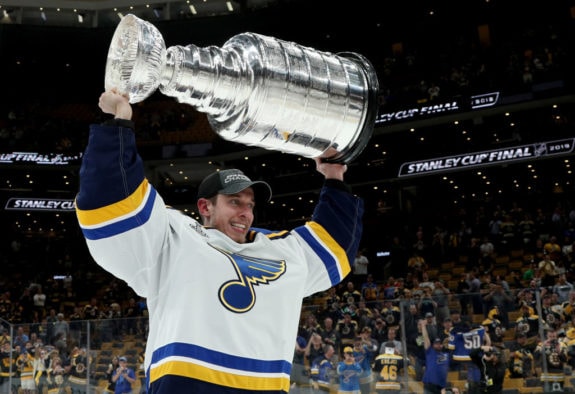
Binnington’s story is legendary and in the 2019-20 season, he began to show that it was far more than a fluke. Understandably, Blues fans are quite fond of the goaltender whom they most credit for turning their season from last in the league to hoisting the Stanley Cup. Perhaps it’s no surprise that he rose from an 11 seed to reach the Final Four. After all, overcoming adversity isn’t exactly new to him, and he is never, ever nervous.
Al MacInnis
Al MacInnis played the first 803 games of his Hockey Hall of Fame career with the Flames, where he won his lone Stanley Cup in 1989. He won the Conn Smythe trophy that year as well, and it was the first of three consecutive seasons where he was a Norris Trophy finalist. He was already an established superstar before he arrived in St. Louis.
Following the 1993-94 season, MacInnis arrived with the Blues as a Restricted Free Agent (RFA), for whom they had to surrender Phil Housley and two second-round picks. It turned out to be perhaps the greatest free-agent signing in franchise history.
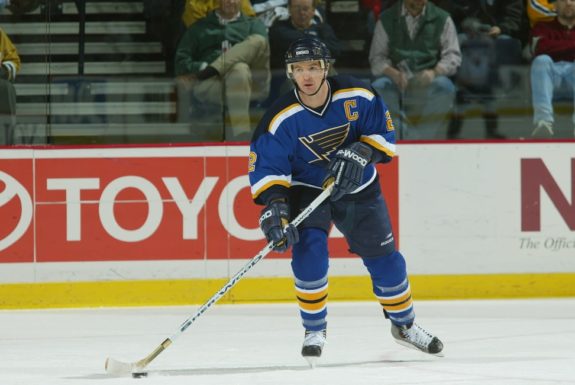
MacInnis played 613 games with the Blues, logging 452 assists. That puts him eighth in franchise history in points, and his 325 assists put him fifth in that category. He won his first and only Norris Trophy in the 1998-99 season in which he recorded 62 points, was plus-33, and took 314 shots. The following season, he was a major factor in the Presidents’ Trophy run.
MacInnis retired after just three games in the 2003-04 season, having suffered a detached retina in one eye. He remains in the team’s front office as a Senior Advisor to the general manager. His inevitable Hall of Fame induction came in 2007.
Runner Up: Alex Pietrangelo
It’s amazing how much difference a year or two can make. If you’d taken a poll of Blues fans at the conclusion of the 2017-18 season, many might have voted that Pietrangelo was not fit to be the team’s captain. One year later, he was lifting the franchise’s first-ever Stanley Cup.
A year after that, fans are almost univocally fearful that Pietrangelo might walk as an Unrestricted Free Agent (UFA), ending what could easily become the greatest Blues career of all time. That cocktail of emotions is what helped push the team’s current captain to the tournament finals.
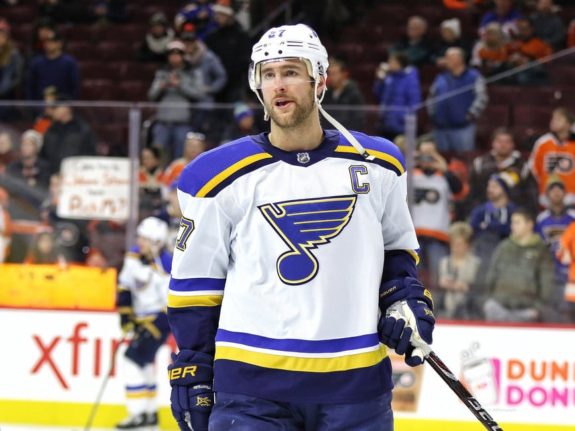
Pietrangelo is already a franchise leader in 13 categories, including games played (fifth, 758), assists (third, 341) points (ninth, 450) and even defensive point shares (first, 48.7). He had a terrific playoff campaign en route to the Cup, scoring 19 points (and leading the team with 16 assists) in 26 games. He was on track for his best season in 2019-20, with 52 points in 70 games before the COVID-19 crisis put that campaign on hold.
As of this writing, Pietrangelo’s permanent legacy with the Blues is yet to be written. He will always be the first captain and first player ever to lift the Stanley Cup in a Blues sweater. If he chooses to leave, there won’t be much resentment amongst fans, but it will certainly be bittersweet.
If he stays, he will be the first player to play 1,000 games in a Blues sweater, will lock down several other franchise records, and he will certainly eventually have his number in the rafters and a statue outside of Enterprise Center. Barring an unforeseen turn of events, he would retire with the most prolific legacy in franchise history. Even now, only a handful of players rival the legacy he’s built. One of them is the bracket’s champion.
Champion: Brett Hull
No debate about the most potent goal scorer in NHL history would be complete without Brett Hull’s name coming up. So it is no surprise that he is a distant leader in that category with the Blues at 527, passing Federko at 352 by almost 200 tallies. Though “the Golden Brett” played for four teams and won Stanley Cups in two other cities, he is absolutely synonymous with St. Louis, particularly after last year’s Cup run. He was the first overall seed in our bracket, and it’s no surprise that he took the title in the end.
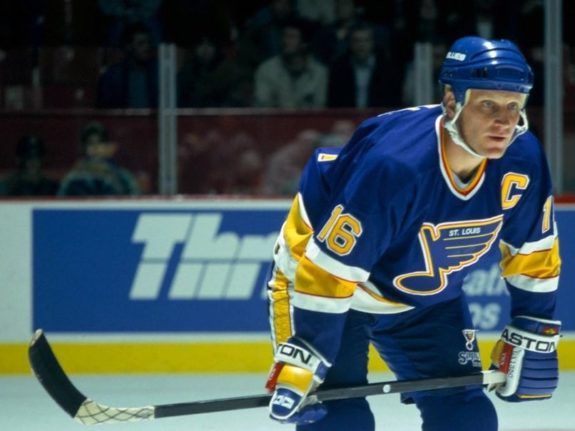
The Blues surrendered Rob Ramage and Rick Wamsley in March of 1988 to acquire the young Hull, in what is now considered one of the worst trades in NHL history for the Flames. Hull already had 50 points in 52 games in his first full NHL season, but there were questions about his conditioning and determination.
Hull spent the rest of his career putting those questions to bed. He played 744 games in the Blue Note, tallying 936 points in that time. He won both the Hart Trophy and the Lester B. Pearson Award for his 1990-91 season. He led the league with 72 goals in 80 games in what would become a distant leader for the greatest era-adjusted goal-scoring season of all time. Though he was hardly the most well-rounded player in NHL history, Hull scored goals, all the time, and he was among the most popular athletes In St. Louis in the 1990s.
Yes, it was a hard pill to swallow to watch Hull leave for the Stars before the 1998-99 season and immediately win a Stanley Cup with his new franchise (ironically under Hitchcock). But whatever resentment there was quickly washed away upon his retirement after the briefest of stints with the Coyotes in 2005-06. He has everything Pietrangelo might one day have: a statue, a retired number, and a Hockey Hall of Fame induction.
And if there was any doubt about the franchise Hull considered his home, one only needed to watch his (perhaps somewhat-inebriated) antics during the Stanley Cup run and celebration to see that Hull truly bleeds blue. He may have celebrated harder than he did for either of his Cup victories as a player. It was a celebration no Blues fan — nor Hull’s liver — will ever forget.
Who is Your Greatest?
Do you agree with the fan’s decision? Do you think Plager, Sutter, Federko, or Pietrangelo should have gotten the nod? How do you think this tournament will look if it’s organized again in 10 years? Let us know in the comments! For now, in the eyes of the fans, there’s no question that Hull is the Blues’ greatest of all time.